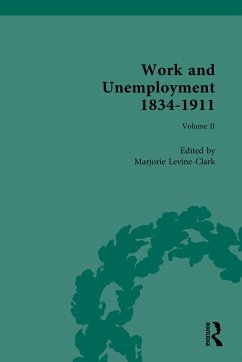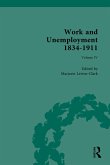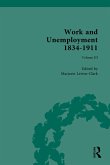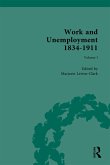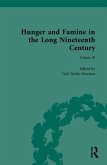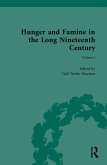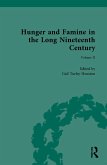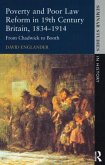Work and Unemployment 1834-1911
Herausgegeben:Levine-Clark, Marjorie
Work and Unemployment 1834-1911
Herausgegeben:Levine-Clark, Marjorie
- Gebundenes Buch
- Merkliste
- Auf die Merkliste
- Bewerten Bewerten
- Teilen
- Produkt teilen
- Produkterinnerung
- Produkterinnerung
This volume explores questions surrounding what types of assistance were available to people out of work and who should receive that assistance during the nineteenth century. Documents on the Poor Law, voluntary organizations, and work relief schemes all demonstrate how central the work imperative was in the ways officials decided which applicants for assistance were deserving and which were not. Sources address many of the significant issues surrounding local relief to the unemployed, the growing influence of methodical approaches to charitable giving, and the use of measures of character…mehr
Andere Kunden interessierten sich auch für
![Work and Unemployment 1834-1911 Work and Unemployment 1834-1911]() Work and Unemployment 1834-1911137,99 €
Work and Unemployment 1834-1911137,99 €![Work and Unemployment 1834-1911 Work and Unemployment 1834-1911]() Work and Unemployment 1834-1911137,99 €
Work and Unemployment 1834-1911137,99 €![Work and Unemployment 1834-1911 Work and Unemployment 1834-1911]() Work and Unemployment 1834-1911137,99 €
Work and Unemployment 1834-1911137,99 €![Hunger and Famine in the Long Nineteenth Century Hunger and Famine in the Long Nineteenth Century]() Hunger and Famine in the Long Nineteenth Century137,99 €
Hunger and Famine in the Long Nineteenth Century137,99 €![Hunger and Famine in the Long Nineteenth Century Hunger and Famine in the Long Nineteenth Century]() Hunger and Famine in the Long Nineteenth Century137,99 €
Hunger and Famine in the Long Nineteenth Century137,99 €![Hunger and Famine in the Long Nineteenth Century Hunger and Famine in the Long Nineteenth Century]() Hunger and Famine in the Long Nineteenth Century137,99 €
Hunger and Famine in the Long Nineteenth Century137,99 €![Poverty and Poor Law Reform in Nineteenth-Century Britain, 1834-1914 Poverty and Poor Law Reform in Nineteenth-Century Britain, 1834-1914]() David EnglanderPoverty and Poor Law Reform in Nineteenth-Century Britain, 1834-191458,99 €
David EnglanderPoverty and Poor Law Reform in Nineteenth-Century Britain, 1834-191458,99 €-
-
-
This volume explores questions surrounding what types of assistance were available to people out of work and who should receive that assistance during the nineteenth century. Documents on the Poor Law, voluntary organizations, and work relief schemes all demonstrate how central the work imperative was in the ways officials decided which applicants for assistance were deserving and which were not. Sources address many of the significant issues surrounding local relief to the unemployed, the growing influence of methodical approaches to charitable giving, and the use of measures of character embedded in the work imperative to choose worthy men to relieve. Accompanied by extensive editorial commentary, this volume will be of great interest to students of British History.
Produktdetails
- Produktdetails
- Routledge Historical Resources
- Verlag: Routledge / Taylor & Francis
- Seitenzahl: 456
- Erscheinungstermin: 17. Juni 2022
- Englisch
- Abmessung: 234mm x 156mm x 27mm
- Gewicht: 453g
- ISBN-13: 9780367335212
- ISBN-10: 0367335212
- Artikelnr.: 67529036
- Herstellerkennzeichnung
- Libri GmbH
- Europaallee 1
- 36244 Bad Hersfeld
- gpsr@libri.de
- Routledge Historical Resources
- Verlag: Routledge / Taylor & Francis
- Seitenzahl: 456
- Erscheinungstermin: 17. Juni 2022
- Englisch
- Abmessung: 234mm x 156mm x 27mm
- Gewicht: 453g
- ISBN-13: 9780367335212
- ISBN-10: 0367335212
- Artikelnr.: 67529036
- Herstellerkennzeichnung
- Libri GmbH
- Europaallee 1
- 36244 Bad Hersfeld
- gpsr@libri.de
Marjorie Levine-Clark is Professor of History at University of Colorado Denver, USA
Volume 2: Unemployed before Unemployment
Part 1: The Poor Law
1. Anon, 'Progress of Pauperism', Penny Magazine of the Society for the Diffusion of Useful Knowledge, 3 (14 June 1834), pp. 231-2.
2. Anti-Poor Law Sentiment in the Press
2.1 Anon., 'New Poor Law - Great Yorkshire Meeting', Preston Chronicle, 27 May 1837, p. 4.
2.2 Anon., 'Meeting to Resist the New Poor Law', Manchester Times, 19 October 1844, p. 6.
2.3 'Local Intelligence - Rochdale', Leeds Mercury, 26 October 1844, p. 7.
3. J. Livesey, 'An Address to the Guardians of the Poor', Livesey's Moral Reformer 20 (November 1838), pp. 177-8.
4. Correspondence on Managing the Poor Law and the Able-Bodied Unemployed.
4.1 Letter from Charles Bond, Clerk to the Guardians of the Axminster Poor Law Union, 1843.
4.2 Letter from W M Trutt, Member of the Axminster Board of Guardians, to the Poor Law Commission, 1843.
4.3 Draft Letter from the Poor Law Commission to William Ashton, Clerk to the Guardians of the Basford Poor Law Union, 1839.
4.4 Letter from the Reverend A Padley, [Alfred Padley] writing from Bulwell Hall, to the Poor Law Commission, 1840.
4.5 Letter from Thomas Henshaw (unemployed Framework Knitter from Ilkeston) appealing to the Poor Law Commission, 1842.
4.6 Draft letter from the Poor Law Commission to William Ashton, Clerk to the Guardians of the Basford Poor Law Union, 1842
4.7 Letter from Edward Senior, Assistant Commissioner for the Poor Law, on Nottingham situation regarding relaxation of the rule regarding able-bodied relief, 1839.
4.8 Covering letter from Edwin Chadwick, Secretary Poor Law Commission Office, to S M Phillipps, [Home Office], enclosing Report dated 10 Dec 1839, by Edward Senior on the state of Nottingham Poor Law Union and Copy of a resolution from the board of guardians, dated 2 Dec 1839, setting out their scheme, 1839.
5. Poor Law Commission, Thirteenth Annual Report of the Poor Law Commissioners with Appendices (London: W. Clowes and Sons, 1847), pp. 5-9, 36-40.
6. G. P. Scrope, The Irish Poor Law: How It Has Failed? And Why? (London: James Ridgway, 1849), pp. 3-25.
7. Correspondence from G. W. Muir to the Home Office, concerning the poor of Glasgow, 1848.
8. Anon, 'Relief to Able-bodied but Unemployed Poor', Poor Law Magazine for Scotland, 5 (1863), pp. 423-8.
9. Anon, 'The Working Classes and Workhouse Tests', Leader and Saturday Analyst, 21 February 1857, p. 183.
10. Anon, 'The Alleged Failure of the English Poor Law', London Review, 16 February 1861, p. 162.
11. E. W. Hollond, 'The Poor Laws and Metropolitan Poor Law Administration', Contemporary Review (August 1868): 502-507, 509-511.
12. J. A. Reid, 'The Abolition of Out-Door Relief', Poor Law Magazine and Parochial Journal 10:1 (January 1882), pp. 1-7.
13. J. Theodore Dodd, 'To Boards of Guardians in Rural Districts - The Winter's Distress, How to Provide for the Unemployed', in Tracts on Social Questions 1889-94 (London: National Press Agency, 1894), pp. 1-7.
14. Report of the Royal Commission on the Poor Law and Relief of Distress, 1908
14.1 Anon, 'Are Women Able-Bodied?' in Report of the Royal Commission on the Poor Laws and Relief of Distress (London: HMSO, 1909), pp. 1045-6.
14.2 'The Outdoor Labour Test' in Report of the Royal Commission on the Poor Laws and Relief of Distress (London: HMSO, 1909), pp. 1047-56.
Section 2: Charity
15. P. H. Holland, Self-Providence vs Reliance upon Charity-An Essay on Dispensaries (Manchester: Love and Barton, 1838), pp. 3-12.
16. Anon, 'The Unemployed in Edinburgh', Caledonian Mercury, 22 June 1848, p. 4.
17. Three Letters Regarding a Petition to Queen Victoria from the Unemployed Handloom Weavers of Spitalfields Asking for Relief from the Manufacturers' Relief Fund, 1852.
18. The Charities Record: Calling on Donors to Subscribe
18.1 On the East End of London, The Charities' Record and Philanthropic Messenger: The Organ of the Charitable World, 1:1 (31 July 1867), p. 2.
18.2 On Winter Distress, The Charities' Record and Philanthropic Messenger: The Organ of the Charitable World, 1:4 (31 October 1867), p. 37-8.
18.3 'Urgent and Deserving', The Charities' Record and Philanthropic Messenger: The Organ of the Charitable World, 1:7 (31 January 1868) p.83.
19. Ballads for Charity [images]
19.1 White, J. J. White, 'The Appeal of the Unemployed' (Liverpool: John White, c. 1870).
19.2 Anon, 'Lines on the Unemployed and the Terrible Distress' (London: H.P. Such, [between 1886 and 1917]).
20. Anon, The Charity Organisation Society: Its Objects and Mode of Operation, 3rd ed. (London: Longmans, Green, and Co., 1875), pp. 3-9.
21. Anon, Employment in the Country for Poor London Families, Especially Widows with Children (London: Charity Organistaion Society, 1872), pp. 1-7, 9-16.
22. Captain A. Brown, The Repression of Vagrancy and Indiscriminate Almsgiving 2nd ed. rev. (London: Simpkin, Marshall, and Co., 1876), pp. 3-24
23. Fund for the Paddington Unemployed
23. 1 W. M. Lees, 'Fund for the Paddington Unemployed, Special Appeal', 1887.
23. 2 W. M. Lees and W. Abbott, 'Fund for the Paddington Unemployed. Report of the Executive Committee', 1888.
24. First Report of the Mansion House Conference on the Condition of the Unemployed (London: Eden, Fisher, and Co., 1888), pp. 1-12.
25. 'Suggestions and Suggested Rules for Dealing with Exceptional Distress by Local Committees', Charity Organisation Paper, 1889, pp. 1-8.
26. Anon., 'Imperial Typhoid: The Unemployed' Hospital, 15:383 (1894), pp. 275-6.
27. G. Craighill, A Paper: An Experiment in Dealing with the Out-of-Work Question, read by George Craighill, Clerk to the Gateshead Guardians, National Poor Law Association, Conference in Newcastle (Gateshead on Tyne: Howe Brothers, 1895), pp. 3-7.
28. 'Report of the Charity Organisation Society's Committee on the Administration of the Mayor's Relief Fund, 1908-9', in Reports and Accounts of the Mayor's Relief Fund. Nottingham, 1908-09, pp. 13-34, 37-39, 60-62.
Part 3: Work Relief
29. Anon, 'Employment' in The Bristol Job Nott, or Labouring Man's Friend (London, Seeley and Sons, 1832).
30. Anon, 'The Present Condition of the Irish Poor', Economist, Weekly Commercial Times 5:1 (2 January 1847), pp. 5-6.
31. A letter from the Magistrates of Glasgow and the Sheriff of Lanark, calling attention to the alarming state of the manufacturing population and requesting the appointment of a relief committee for Glasgow, 1848.
32. R. M. Muggeridge, Notes on the Irish 'Difficulty', with Remedial Suggestions (Dublin: James McGlashan, 1849), pp. 1-5, 40-9.
33. Anon, 'Relief Works for the Lancashire People', The London Review of Politics, Society, Literature, Art, and Science, 6:142 (30 May1863), p. 565-66.
34, Anon, 'Lancashire's Lesson', Examiner, 17 December 1864, p. 803.
35. Anon, 'Distress and Public Works', Cambrian News and Welsh Farmers' Gazette, 26 February 1886, p. 4.
36. Correspondence between the Fabian Executive Committee and the Local Government Board on Public Works.
36. 1 Sydney Olivier to President of the Local Government Board (on behalf of Fabian executive committee) Draft, 1887.
36. 2 Letter from Local Government Board responding to Fabian Society, 2 December 1887.
37. Local Government Board Circular Letters on Work Relief
37.1 Local Government Board Circular Letter on Pauperism and Distress, 14 November 1892, in Tracts on Social and Industrial Questions 1882-1894 (London: HMSO, 1894).
37.2 Local Government Board Circular on the Unemployed, 30 September 1893, in Tracts on Social and Industrial Questions 1882-1894, (London: HMSO, 1894).
38. J. Wilson, 'The Unemployed Breakin' Stanes', c.1880-1900.
39. C. S. Loch, 'The State and the Unemployed: I: Relief by Extra Public Services', Charity Organisation Review 9:107 (December 1893), pp. 439-44.
40. Millbank Prison-Report of the Surveyor on the Demolition of Millbank Prison by the Unemployed (London: HMSO, 1893), pp. 2-3.
41. Report of the Executive Committee with Recommendations for Giving Work to the Unemployed (Liverpool: Rockliff Brothers, 1893), pp. 3, 10-13, 20-3.
42. London County Council, Lack of Employment in London. Minutes of a Conference between London County Council and Administrative Authorities. London, (London: LCC, 1903), pp. 3-5, 9-13, 15, 21, 23-24, 25-27
43. 'Conference at the Local Government Board-London Boards Meet the President-and Discuss Means of Dealing with the Unemployed', Local Government Journal (October 1904), pp. 583-4.
44. City of Birmingham Aid Committee, 'Memorandum on Work for the Unemployed', 1905, pp. 1-7.
45. Board of Trade, 'The Growth of Trade Unions with Particular Reference to the Payment of Unemployed Benefit', Royal Commission on the Poor Laws and Relief of Distress. Appendix. Volume IX. (1910), pp. 1-6, 8.
Index
Part 1: The Poor Law
1. Anon, 'Progress of Pauperism', Penny Magazine of the Society for the Diffusion of Useful Knowledge, 3 (14 June 1834), pp. 231-2.
2. Anti-Poor Law Sentiment in the Press
2.1 Anon., 'New Poor Law - Great Yorkshire Meeting', Preston Chronicle, 27 May 1837, p. 4.
2.2 Anon., 'Meeting to Resist the New Poor Law', Manchester Times, 19 October 1844, p. 6.
2.3 'Local Intelligence - Rochdale', Leeds Mercury, 26 October 1844, p. 7.
3. J. Livesey, 'An Address to the Guardians of the Poor', Livesey's Moral Reformer 20 (November 1838), pp. 177-8.
4. Correspondence on Managing the Poor Law and the Able-Bodied Unemployed.
4.1 Letter from Charles Bond, Clerk to the Guardians of the Axminster Poor Law Union, 1843.
4.2 Letter from W M Trutt, Member of the Axminster Board of Guardians, to the Poor Law Commission, 1843.
4.3 Draft Letter from the Poor Law Commission to William Ashton, Clerk to the Guardians of the Basford Poor Law Union, 1839.
4.4 Letter from the Reverend A Padley, [Alfred Padley] writing from Bulwell Hall, to the Poor Law Commission, 1840.
4.5 Letter from Thomas Henshaw (unemployed Framework Knitter from Ilkeston) appealing to the Poor Law Commission, 1842.
4.6 Draft letter from the Poor Law Commission to William Ashton, Clerk to the Guardians of the Basford Poor Law Union, 1842
4.7 Letter from Edward Senior, Assistant Commissioner for the Poor Law, on Nottingham situation regarding relaxation of the rule regarding able-bodied relief, 1839.
4.8 Covering letter from Edwin Chadwick, Secretary Poor Law Commission Office, to S M Phillipps, [Home Office], enclosing Report dated 10 Dec 1839, by Edward Senior on the state of Nottingham Poor Law Union and Copy of a resolution from the board of guardians, dated 2 Dec 1839, setting out their scheme, 1839.
5. Poor Law Commission, Thirteenth Annual Report of the Poor Law Commissioners with Appendices (London: W. Clowes and Sons, 1847), pp. 5-9, 36-40.
6. G. P. Scrope, The Irish Poor Law: How It Has Failed? And Why? (London: James Ridgway, 1849), pp. 3-25.
7. Correspondence from G. W. Muir to the Home Office, concerning the poor of Glasgow, 1848.
8. Anon, 'Relief to Able-bodied but Unemployed Poor', Poor Law Magazine for Scotland, 5 (1863), pp. 423-8.
9. Anon, 'The Working Classes and Workhouse Tests', Leader and Saturday Analyst, 21 February 1857, p. 183.
10. Anon, 'The Alleged Failure of the English Poor Law', London Review, 16 February 1861, p. 162.
11. E. W. Hollond, 'The Poor Laws and Metropolitan Poor Law Administration', Contemporary Review (August 1868): 502-507, 509-511.
12. J. A. Reid, 'The Abolition of Out-Door Relief', Poor Law Magazine and Parochial Journal 10:1 (January 1882), pp. 1-7.
13. J. Theodore Dodd, 'To Boards of Guardians in Rural Districts - The Winter's Distress, How to Provide for the Unemployed', in Tracts on Social Questions 1889-94 (London: National Press Agency, 1894), pp. 1-7.
14. Report of the Royal Commission on the Poor Law and Relief of Distress, 1908
14.1 Anon, 'Are Women Able-Bodied?' in Report of the Royal Commission on the Poor Laws and Relief of Distress (London: HMSO, 1909), pp. 1045-6.
14.2 'The Outdoor Labour Test' in Report of the Royal Commission on the Poor Laws and Relief of Distress (London: HMSO, 1909), pp. 1047-56.
Section 2: Charity
15. P. H. Holland, Self-Providence vs Reliance upon Charity-An Essay on Dispensaries (Manchester: Love and Barton, 1838), pp. 3-12.
16. Anon, 'The Unemployed in Edinburgh', Caledonian Mercury, 22 June 1848, p. 4.
17. Three Letters Regarding a Petition to Queen Victoria from the Unemployed Handloom Weavers of Spitalfields Asking for Relief from the Manufacturers' Relief Fund, 1852.
18. The Charities Record: Calling on Donors to Subscribe
18.1 On the East End of London, The Charities' Record and Philanthropic Messenger: The Organ of the Charitable World, 1:1 (31 July 1867), p. 2.
18.2 On Winter Distress, The Charities' Record and Philanthropic Messenger: The Organ of the Charitable World, 1:4 (31 October 1867), p. 37-8.
18.3 'Urgent and Deserving', The Charities' Record and Philanthropic Messenger: The Organ of the Charitable World, 1:7 (31 January 1868) p.83.
19. Ballads for Charity [images]
19.1 White, J. J. White, 'The Appeal of the Unemployed' (Liverpool: John White, c. 1870).
19.2 Anon, 'Lines on the Unemployed and the Terrible Distress' (London: H.P. Such, [between 1886 and 1917]).
20. Anon, The Charity Organisation Society: Its Objects and Mode of Operation, 3rd ed. (London: Longmans, Green, and Co., 1875), pp. 3-9.
21. Anon, Employment in the Country for Poor London Families, Especially Widows with Children (London: Charity Organistaion Society, 1872), pp. 1-7, 9-16.
22. Captain A. Brown, The Repression of Vagrancy and Indiscriminate Almsgiving 2nd ed. rev. (London: Simpkin, Marshall, and Co., 1876), pp. 3-24
23. Fund for the Paddington Unemployed
23. 1 W. M. Lees, 'Fund for the Paddington Unemployed, Special Appeal', 1887.
23. 2 W. M. Lees and W. Abbott, 'Fund for the Paddington Unemployed. Report of the Executive Committee', 1888.
24. First Report of the Mansion House Conference on the Condition of the Unemployed (London: Eden, Fisher, and Co., 1888), pp. 1-12.
25. 'Suggestions and Suggested Rules for Dealing with Exceptional Distress by Local Committees', Charity Organisation Paper, 1889, pp. 1-8.
26. Anon., 'Imperial Typhoid: The Unemployed' Hospital, 15:383 (1894), pp. 275-6.
27. G. Craighill, A Paper: An Experiment in Dealing with the Out-of-Work Question, read by George Craighill, Clerk to the Gateshead Guardians, National Poor Law Association, Conference in Newcastle (Gateshead on Tyne: Howe Brothers, 1895), pp. 3-7.
28. 'Report of the Charity Organisation Society's Committee on the Administration of the Mayor's Relief Fund, 1908-9', in Reports and Accounts of the Mayor's Relief Fund. Nottingham, 1908-09, pp. 13-34, 37-39, 60-62.
Part 3: Work Relief
29. Anon, 'Employment' in The Bristol Job Nott, or Labouring Man's Friend (London, Seeley and Sons, 1832).
30. Anon, 'The Present Condition of the Irish Poor', Economist, Weekly Commercial Times 5:1 (2 January 1847), pp. 5-6.
31. A letter from the Magistrates of Glasgow and the Sheriff of Lanark, calling attention to the alarming state of the manufacturing population and requesting the appointment of a relief committee for Glasgow, 1848.
32. R. M. Muggeridge, Notes on the Irish 'Difficulty', with Remedial Suggestions (Dublin: James McGlashan, 1849), pp. 1-5, 40-9.
33. Anon, 'Relief Works for the Lancashire People', The London Review of Politics, Society, Literature, Art, and Science, 6:142 (30 May1863), p. 565-66.
34, Anon, 'Lancashire's Lesson', Examiner, 17 December 1864, p. 803.
35. Anon, 'Distress and Public Works', Cambrian News and Welsh Farmers' Gazette, 26 February 1886, p. 4.
36. Correspondence between the Fabian Executive Committee and the Local Government Board on Public Works.
36. 1 Sydney Olivier to President of the Local Government Board (on behalf of Fabian executive committee) Draft, 1887.
36. 2 Letter from Local Government Board responding to Fabian Society, 2 December 1887.
37. Local Government Board Circular Letters on Work Relief
37.1 Local Government Board Circular Letter on Pauperism and Distress, 14 November 1892, in Tracts on Social and Industrial Questions 1882-1894 (London: HMSO, 1894).
37.2 Local Government Board Circular on the Unemployed, 30 September 1893, in Tracts on Social and Industrial Questions 1882-1894, (London: HMSO, 1894).
38. J. Wilson, 'The Unemployed Breakin' Stanes', c.1880-1900.
39. C. S. Loch, 'The State and the Unemployed: I: Relief by Extra Public Services', Charity Organisation Review 9:107 (December 1893), pp. 439-44.
40. Millbank Prison-Report of the Surveyor on the Demolition of Millbank Prison by the Unemployed (London: HMSO, 1893), pp. 2-3.
41. Report of the Executive Committee with Recommendations for Giving Work to the Unemployed (Liverpool: Rockliff Brothers, 1893), pp. 3, 10-13, 20-3.
42. London County Council, Lack of Employment in London. Minutes of a Conference between London County Council and Administrative Authorities. London, (London: LCC, 1903), pp. 3-5, 9-13, 15, 21, 23-24, 25-27
43. 'Conference at the Local Government Board-London Boards Meet the President-and Discuss Means of Dealing with the Unemployed', Local Government Journal (October 1904), pp. 583-4.
44. City of Birmingham Aid Committee, 'Memorandum on Work for the Unemployed', 1905, pp. 1-7.
45. Board of Trade, 'The Growth of Trade Unions with Particular Reference to the Payment of Unemployed Benefit', Royal Commission on the Poor Laws and Relief of Distress. Appendix. Volume IX. (1910), pp. 1-6, 8.
Index
Volume 2: Unemployed before Unemployment
Part 1: The Poor Law
1. Anon, 'Progress of Pauperism', Penny Magazine of the Society for the Diffusion of Useful Knowledge, 3 (14 June 1834), pp. 231-2.
2. Anti-Poor Law Sentiment in the Press
2.1 Anon., 'New Poor Law - Great Yorkshire Meeting', Preston Chronicle, 27 May 1837, p. 4.
2.2 Anon., 'Meeting to Resist the New Poor Law', Manchester Times, 19 October 1844, p. 6.
2.3 'Local Intelligence - Rochdale', Leeds Mercury, 26 October 1844, p. 7.
3. J. Livesey, 'An Address to the Guardians of the Poor', Livesey's Moral Reformer 20 (November 1838), pp. 177-8.
4. Correspondence on Managing the Poor Law and the Able-Bodied Unemployed.
4.1 Letter from Charles Bond, Clerk to the Guardians of the Axminster Poor Law Union, 1843.
4.2 Letter from W M Trutt, Member of the Axminster Board of Guardians, to the Poor Law Commission, 1843.
4.3 Draft Letter from the Poor Law Commission to William Ashton, Clerk to the Guardians of the Basford Poor Law Union, 1839.
4.4 Letter from the Reverend A Padley, [Alfred Padley] writing from Bulwell Hall, to the Poor Law Commission, 1840.
4.5 Letter from Thomas Henshaw (unemployed Framework Knitter from Ilkeston) appealing to the Poor Law Commission, 1842.
4.6 Draft letter from the Poor Law Commission to William Ashton, Clerk to the Guardians of the Basford Poor Law Union, 1842
4.7 Letter from Edward Senior, Assistant Commissioner for the Poor Law, on Nottingham situation regarding relaxation of the rule regarding able-bodied relief, 1839.
4.8 Covering letter from Edwin Chadwick, Secretary Poor Law Commission Office, to S M Phillipps, [Home Office], enclosing Report dated 10 Dec 1839, by Edward Senior on the state of Nottingham Poor Law Union and Copy of a resolution from the board of guardians, dated 2 Dec 1839, setting out their scheme, 1839.
5. Poor Law Commission, Thirteenth Annual Report of the Poor Law Commissioners with Appendices (London: W. Clowes and Sons, 1847), pp. 5-9, 36-40.
6. G. P. Scrope, The Irish Poor Law: How It Has Failed? And Why? (London: James Ridgway, 1849), pp. 3-25.
7. Correspondence from G. W. Muir to the Home Office, concerning the poor of Glasgow, 1848.
8. Anon, 'Relief to Able-bodied but Unemployed Poor', Poor Law Magazine for Scotland, 5 (1863), pp. 423-8.
9. Anon, 'The Working Classes and Workhouse Tests', Leader and Saturday Analyst, 21 February 1857, p. 183.
10. Anon, 'The Alleged Failure of the English Poor Law', London Review, 16 February 1861, p. 162.
11. E. W. Hollond, 'The Poor Laws and Metropolitan Poor Law Administration', Contemporary Review (August 1868): 502-507, 509-511.
12. J. A. Reid, 'The Abolition of Out-Door Relief', Poor Law Magazine and Parochial Journal 10:1 (January 1882), pp. 1-7.
13. J. Theodore Dodd, 'To Boards of Guardians in Rural Districts - The Winter's Distress, How to Provide for the Unemployed', in Tracts on Social Questions 1889-94 (London: National Press Agency, 1894), pp. 1-7.
14. Report of the Royal Commission on the Poor Law and Relief of Distress, 1908
14.1 Anon, 'Are Women Able-Bodied?' in Report of the Royal Commission on the Poor Laws and Relief of Distress (London: HMSO, 1909), pp. 1045-6.
14.2 'The Outdoor Labour Test' in Report of the Royal Commission on the Poor Laws and Relief of Distress (London: HMSO, 1909), pp. 1047-56.
Section 2: Charity
15. P. H. Holland, Self-Providence vs Reliance upon Charity-An Essay on Dispensaries (Manchester: Love and Barton, 1838), pp. 3-12.
16. Anon, 'The Unemployed in Edinburgh', Caledonian Mercury, 22 June 1848, p. 4.
17. Three Letters Regarding a Petition to Queen Victoria from the Unemployed Handloom Weavers of Spitalfields Asking for Relief from the Manufacturers' Relief Fund, 1852.
18. The Charities Record: Calling on Donors to Subscribe
18.1 On the East End of London, The Charities' Record and Philanthropic Messenger: The Organ of the Charitable World, 1:1 (31 July 1867), p. 2.
18.2 On Winter Distress, The Charities' Record and Philanthropic Messenger: The Organ of the Charitable World, 1:4 (31 October 1867), p. 37-8.
18.3 'Urgent and Deserving', The Charities' Record and Philanthropic Messenger: The Organ of the Charitable World, 1:7 (31 January 1868) p.83.
19. Ballads for Charity [images]
19.1 White, J. J. White, 'The Appeal of the Unemployed' (Liverpool: John White, c. 1870).
19.2 Anon, 'Lines on the Unemployed and the Terrible Distress' (London: H.P. Such, [between 1886 and 1917]).
20. Anon, The Charity Organisation Society: Its Objects and Mode of Operation, 3rd ed. (London: Longmans, Green, and Co., 1875), pp. 3-9.
21. Anon, Employment in the Country for Poor London Families, Especially Widows with Children (London: Charity Organistaion Society, 1872), pp. 1-7, 9-16.
22. Captain A. Brown, The Repression of Vagrancy and Indiscriminate Almsgiving 2nd ed. rev. (London: Simpkin, Marshall, and Co., 1876), pp. 3-24
23. Fund for the Paddington Unemployed
23. 1 W. M. Lees, 'Fund for the Paddington Unemployed, Special Appeal', 1887.
23. 2 W. M. Lees and W. Abbott, 'Fund for the Paddington Unemployed. Report of the Executive Committee', 1888.
24. First Report of the Mansion House Conference on the Condition of the Unemployed (London: Eden, Fisher, and Co., 1888), pp. 1-12.
25. 'Suggestions and Suggested Rules for Dealing with Exceptional Distress by Local Committees', Charity Organisation Paper, 1889, pp. 1-8.
26. Anon., 'Imperial Typhoid: The Unemployed' Hospital, 15:383 (1894), pp. 275-6.
27. G. Craighill, A Paper: An Experiment in Dealing with the Out-of-Work Question, read by George Craighill, Clerk to the Gateshead Guardians, National Poor Law Association, Conference in Newcastle (Gateshead on Tyne: Howe Brothers, 1895), pp. 3-7.
28. 'Report of the Charity Organisation Society's Committee on the Administration of the Mayor's Relief Fund, 1908-9', in Reports and Accounts of the Mayor's Relief Fund. Nottingham, 1908-09, pp. 13-34, 37-39, 60-62.
Part 3: Work Relief
29. Anon, 'Employment' in The Bristol Job Nott, or Labouring Man's Friend (London, Seeley and Sons, 1832).
30. Anon, 'The Present Condition of the Irish Poor', Economist, Weekly Commercial Times 5:1 (2 January 1847), pp. 5-6.
31. A letter from the Magistrates of Glasgow and the Sheriff of Lanark, calling attention to the alarming state of the manufacturing population and requesting the appointment of a relief committee for Glasgow, 1848.
32. R. M. Muggeridge, Notes on the Irish 'Difficulty', with Remedial Suggestions (Dublin: James McGlashan, 1849), pp. 1-5, 40-9.
33. Anon, 'Relief Works for the Lancashire People', The London Review of Politics, Society, Literature, Art, and Science, 6:142 (30 May1863), p. 565-66.
34, Anon, 'Lancashire's Lesson', Examiner, 17 December 1864, p. 803.
35. Anon, 'Distress and Public Works', Cambrian News and Welsh Farmers' Gazette, 26 February 1886, p. 4.
36. Correspondence between the Fabian Executive Committee and the Local Government Board on Public Works.
36. 1 Sydney Olivier to President of the Local Government Board (on behalf of Fabian executive committee) Draft, 1887.
36. 2 Letter from Local Government Board responding to Fabian Society, 2 December 1887.
37. Local Government Board Circular Letters on Work Relief
37.1 Local Government Board Circular Letter on Pauperism and Distress, 14 November 1892, in Tracts on Social and Industrial Questions 1882-1894 (London: HMSO, 1894).
37.2 Local Government Board Circular on the Unemployed, 30 September 1893, in Tracts on Social and Industrial Questions 1882-1894, (London: HMSO, 1894).
38. J. Wilson, 'The Unemployed Breakin' Stanes', c.1880-1900.
39. C. S. Loch, 'The State and the Unemployed: I: Relief by Extra Public Services', Charity Organisation Review 9:107 (December 1893), pp. 439-44.
40. Millbank Prison-Report of the Surveyor on the Demolition of Millbank Prison by the Unemployed (London: HMSO, 1893), pp. 2-3.
41. Report of the Executive Committee with Recommendations for Giving Work to the Unemployed (Liverpool: Rockliff Brothers, 1893), pp. 3, 10-13, 20-3.
42. London County Council, Lack of Employment in London. Minutes of a Conference between London County Council and Administrative Authorities. London, (London: LCC, 1903), pp. 3-5, 9-13, 15, 21, 23-24, 25-27
43. 'Conference at the Local Government Board-London Boards Meet the President-and Discuss Means of Dealing with the Unemployed', Local Government Journal (October 1904), pp. 583-4.
44. City of Birmingham Aid Committee, 'Memorandum on Work for the Unemployed', 1905, pp. 1-7.
45. Board of Trade, 'The Growth of Trade Unions with Particular Reference to the Payment of Unemployed Benefit', Royal Commission on the Poor Laws and Relief of Distress. Appendix. Volume IX. (1910), pp. 1-6, 8.
Index
Part 1: The Poor Law
1. Anon, 'Progress of Pauperism', Penny Magazine of the Society for the Diffusion of Useful Knowledge, 3 (14 June 1834), pp. 231-2.
2. Anti-Poor Law Sentiment in the Press
2.1 Anon., 'New Poor Law - Great Yorkshire Meeting', Preston Chronicle, 27 May 1837, p. 4.
2.2 Anon., 'Meeting to Resist the New Poor Law', Manchester Times, 19 October 1844, p. 6.
2.3 'Local Intelligence - Rochdale', Leeds Mercury, 26 October 1844, p. 7.
3. J. Livesey, 'An Address to the Guardians of the Poor', Livesey's Moral Reformer 20 (November 1838), pp. 177-8.
4. Correspondence on Managing the Poor Law and the Able-Bodied Unemployed.
4.1 Letter from Charles Bond, Clerk to the Guardians of the Axminster Poor Law Union, 1843.
4.2 Letter from W M Trutt, Member of the Axminster Board of Guardians, to the Poor Law Commission, 1843.
4.3 Draft Letter from the Poor Law Commission to William Ashton, Clerk to the Guardians of the Basford Poor Law Union, 1839.
4.4 Letter from the Reverend A Padley, [Alfred Padley] writing from Bulwell Hall, to the Poor Law Commission, 1840.
4.5 Letter from Thomas Henshaw (unemployed Framework Knitter from Ilkeston) appealing to the Poor Law Commission, 1842.
4.6 Draft letter from the Poor Law Commission to William Ashton, Clerk to the Guardians of the Basford Poor Law Union, 1842
4.7 Letter from Edward Senior, Assistant Commissioner for the Poor Law, on Nottingham situation regarding relaxation of the rule regarding able-bodied relief, 1839.
4.8 Covering letter from Edwin Chadwick, Secretary Poor Law Commission Office, to S M Phillipps, [Home Office], enclosing Report dated 10 Dec 1839, by Edward Senior on the state of Nottingham Poor Law Union and Copy of a resolution from the board of guardians, dated 2 Dec 1839, setting out their scheme, 1839.
5. Poor Law Commission, Thirteenth Annual Report of the Poor Law Commissioners with Appendices (London: W. Clowes and Sons, 1847), pp. 5-9, 36-40.
6. G. P. Scrope, The Irish Poor Law: How It Has Failed? And Why? (London: James Ridgway, 1849), pp. 3-25.
7. Correspondence from G. W. Muir to the Home Office, concerning the poor of Glasgow, 1848.
8. Anon, 'Relief to Able-bodied but Unemployed Poor', Poor Law Magazine for Scotland, 5 (1863), pp. 423-8.
9. Anon, 'The Working Classes and Workhouse Tests', Leader and Saturday Analyst, 21 February 1857, p. 183.
10. Anon, 'The Alleged Failure of the English Poor Law', London Review, 16 February 1861, p. 162.
11. E. W. Hollond, 'The Poor Laws and Metropolitan Poor Law Administration', Contemporary Review (August 1868): 502-507, 509-511.
12. J. A. Reid, 'The Abolition of Out-Door Relief', Poor Law Magazine and Parochial Journal 10:1 (January 1882), pp. 1-7.
13. J. Theodore Dodd, 'To Boards of Guardians in Rural Districts - The Winter's Distress, How to Provide for the Unemployed', in Tracts on Social Questions 1889-94 (London: National Press Agency, 1894), pp. 1-7.
14. Report of the Royal Commission on the Poor Law and Relief of Distress, 1908
14.1 Anon, 'Are Women Able-Bodied?' in Report of the Royal Commission on the Poor Laws and Relief of Distress (London: HMSO, 1909), pp. 1045-6.
14.2 'The Outdoor Labour Test' in Report of the Royal Commission on the Poor Laws and Relief of Distress (London: HMSO, 1909), pp. 1047-56.
Section 2: Charity
15. P. H. Holland, Self-Providence vs Reliance upon Charity-An Essay on Dispensaries (Manchester: Love and Barton, 1838), pp. 3-12.
16. Anon, 'The Unemployed in Edinburgh', Caledonian Mercury, 22 June 1848, p. 4.
17. Three Letters Regarding a Petition to Queen Victoria from the Unemployed Handloom Weavers of Spitalfields Asking for Relief from the Manufacturers' Relief Fund, 1852.
18. The Charities Record: Calling on Donors to Subscribe
18.1 On the East End of London, The Charities' Record and Philanthropic Messenger: The Organ of the Charitable World, 1:1 (31 July 1867), p. 2.
18.2 On Winter Distress, The Charities' Record and Philanthropic Messenger: The Organ of the Charitable World, 1:4 (31 October 1867), p. 37-8.
18.3 'Urgent and Deserving', The Charities' Record and Philanthropic Messenger: The Organ of the Charitable World, 1:7 (31 January 1868) p.83.
19. Ballads for Charity [images]
19.1 White, J. J. White, 'The Appeal of the Unemployed' (Liverpool: John White, c. 1870).
19.2 Anon, 'Lines on the Unemployed and the Terrible Distress' (London: H.P. Such, [between 1886 and 1917]).
20. Anon, The Charity Organisation Society: Its Objects and Mode of Operation, 3rd ed. (London: Longmans, Green, and Co., 1875), pp. 3-9.
21. Anon, Employment in the Country for Poor London Families, Especially Widows with Children (London: Charity Organistaion Society, 1872), pp. 1-7, 9-16.
22. Captain A. Brown, The Repression of Vagrancy and Indiscriminate Almsgiving 2nd ed. rev. (London: Simpkin, Marshall, and Co., 1876), pp. 3-24
23. Fund for the Paddington Unemployed
23. 1 W. M. Lees, 'Fund for the Paddington Unemployed, Special Appeal', 1887.
23. 2 W. M. Lees and W. Abbott, 'Fund for the Paddington Unemployed. Report of the Executive Committee', 1888.
24. First Report of the Mansion House Conference on the Condition of the Unemployed (London: Eden, Fisher, and Co., 1888), pp. 1-12.
25. 'Suggestions and Suggested Rules for Dealing with Exceptional Distress by Local Committees', Charity Organisation Paper, 1889, pp. 1-8.
26. Anon., 'Imperial Typhoid: The Unemployed' Hospital, 15:383 (1894), pp. 275-6.
27. G. Craighill, A Paper: An Experiment in Dealing with the Out-of-Work Question, read by George Craighill, Clerk to the Gateshead Guardians, National Poor Law Association, Conference in Newcastle (Gateshead on Tyne: Howe Brothers, 1895), pp. 3-7.
28. 'Report of the Charity Organisation Society's Committee on the Administration of the Mayor's Relief Fund, 1908-9', in Reports and Accounts of the Mayor's Relief Fund. Nottingham, 1908-09, pp. 13-34, 37-39, 60-62.
Part 3: Work Relief
29. Anon, 'Employment' in The Bristol Job Nott, or Labouring Man's Friend (London, Seeley and Sons, 1832).
30. Anon, 'The Present Condition of the Irish Poor', Economist, Weekly Commercial Times 5:1 (2 January 1847), pp. 5-6.
31. A letter from the Magistrates of Glasgow and the Sheriff of Lanark, calling attention to the alarming state of the manufacturing population and requesting the appointment of a relief committee for Glasgow, 1848.
32. R. M. Muggeridge, Notes on the Irish 'Difficulty', with Remedial Suggestions (Dublin: James McGlashan, 1849), pp. 1-5, 40-9.
33. Anon, 'Relief Works for the Lancashire People', The London Review of Politics, Society, Literature, Art, and Science, 6:142 (30 May1863), p. 565-66.
34, Anon, 'Lancashire's Lesson', Examiner, 17 December 1864, p. 803.
35. Anon, 'Distress and Public Works', Cambrian News and Welsh Farmers' Gazette, 26 February 1886, p. 4.
36. Correspondence between the Fabian Executive Committee and the Local Government Board on Public Works.
36. 1 Sydney Olivier to President of the Local Government Board (on behalf of Fabian executive committee) Draft, 1887.
36. 2 Letter from Local Government Board responding to Fabian Society, 2 December 1887.
37. Local Government Board Circular Letters on Work Relief
37.1 Local Government Board Circular Letter on Pauperism and Distress, 14 November 1892, in Tracts on Social and Industrial Questions 1882-1894 (London: HMSO, 1894).
37.2 Local Government Board Circular on the Unemployed, 30 September 1893, in Tracts on Social and Industrial Questions 1882-1894, (London: HMSO, 1894).
38. J. Wilson, 'The Unemployed Breakin' Stanes', c.1880-1900.
39. C. S. Loch, 'The State and the Unemployed: I: Relief by Extra Public Services', Charity Organisation Review 9:107 (December 1893), pp. 439-44.
40. Millbank Prison-Report of the Surveyor on the Demolition of Millbank Prison by the Unemployed (London: HMSO, 1893), pp. 2-3.
41. Report of the Executive Committee with Recommendations for Giving Work to the Unemployed (Liverpool: Rockliff Brothers, 1893), pp. 3, 10-13, 20-3.
42. London County Council, Lack of Employment in London. Minutes of a Conference between London County Council and Administrative Authorities. London, (London: LCC, 1903), pp. 3-5, 9-13, 15, 21, 23-24, 25-27
43. 'Conference at the Local Government Board-London Boards Meet the President-and Discuss Means of Dealing with the Unemployed', Local Government Journal (October 1904), pp. 583-4.
44. City of Birmingham Aid Committee, 'Memorandum on Work for the Unemployed', 1905, pp. 1-7.
45. Board of Trade, 'The Growth of Trade Unions with Particular Reference to the Payment of Unemployed Benefit', Royal Commission on the Poor Laws and Relief of Distress. Appendix. Volume IX. (1910), pp. 1-6, 8.
Index

